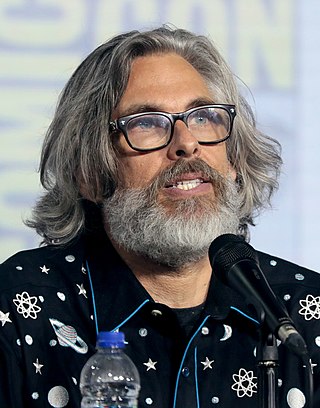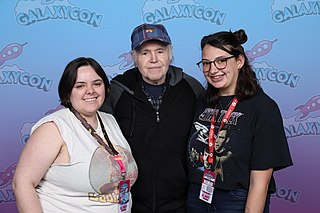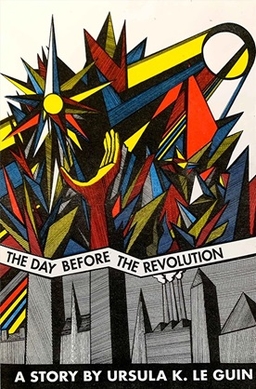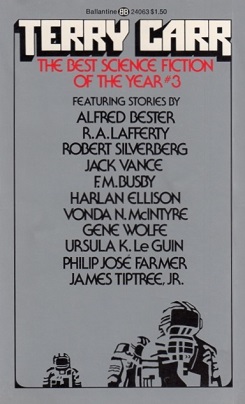Related Research Articles

Science fiction first appeared in television programming in the late 1930s, during what is called the Golden Age of Science Fiction. Special effects and other production techniques allow creators to present a living visual image of an imaginary world not limited by the constraints of reality.

Ursula Kroeber Le Guin was an American author best known for her works of speculative fiction, including science fiction works set in her Hainish universe, and the Earthsea fantasy series. Her work was first published in 1959, and her literary career spanned nearly sixty years, producing more than twenty novels and over a hundred short stories, in addition to poetry, literary criticism, translations, and children's books. Frequently described as an author of science fiction, Le Guin has also been called a "major voice in American Letters". Le Guin said she would prefer to be known as an "American novelist".

"The Ones Who Walk Away from Omelas" is a 1973 short work of philosophical fiction by American writer Ursula K. Le Guin. With deliberately both vague and vivid descriptions, the narrator depicts a summer festival in the utopian city of Omelas, whose prosperity depends on the perpetual misery of a single child. "The Ones Who Walk Away from Omelas" was nominated for the Locus Award for Best Short Fiction in 1974 and won the Hugo Award for Best Short Story in 1974.

Michael Chabon is an American novelist, screenwriter, columnist, and short story writer. Born in Washington, D.C., he spent a year studying at Carnegie Mellon University before transferring to the University of Pittsburgh, graduating in 1984. He subsequently received a Master of Fine Arts in creative writing from the University of California, Irvine.

The Holodeck is a fictional device from the television franchise Star Trek which uses "holograms" to create a realistic 3D simulation of a real or imaginary setting, in which participants can freely interact with the environment as well as objects and characters, and sometimes a predefined narrative.

Walter Marvin Koenig is an American actor and screenwriter. He began acting professionally in the mid-1960s and quickly rose to prominence for his supporting role as Ensign Pavel Chekov in Star Trek: The Original Series (1967–1969). He went on to reprise this role in all six original-cast Star Trek films, and later voiced President Anton Chekov in Star Trek: Picard (2023). He has also acted in several other series and films including Goodbye, Raggedy Ann (1971), The Questor Tapes (1974), and Babylon 5 (1993). In addition to his acting career, Koenig has made a career in writing as well and is known for working on Land of the Lost (1974), Family (1976), What Really Happened to the Class of '65? (1977) and The Powers of Matthew Star (1982).

David Gerrold is an American science fiction screenwriter and novelist. He wrote the script for the original Star Trek episode "The Trouble with Tribbles", created the Sleestak race on the TV series Land of the Lost, and wrote the novelette "The Martian Child", which won both Hugo and Nebula Awards, and was adapted into a 2007 film starring John Cusack.

Jerrald King Goldsmith was an American composer known for his work in film and television scoring. He composed scores for five films in the Star Trek franchise and three in the Rambo franchise, as well as for films including Logan's Run, Planet of the Apes, Tora! Tora! Tora!, Patton, Papillon, Chinatown, The Omen, Alien, Poltergeist, The Secret of NIMH, Medicine Man, Gremlins, Hoosiers, Total Recall, Basic Instinct, Air Force One, L.A. Confidential, Mulan, and The Mummy. He also composed the fanfares accompanying the production logos used by multiple major film studios, and music for the Disney attraction Soarin'.

The Wind's Twelve Quarters is a collection of short stories by American writer Ursula K. Le Guin, named after a line from A. E. Housman's A Shropshire Lad, and first published by Harper & Row in 1975. A retrospective of Le Guin's short stories, it collects 17 previously published pieces of speculative fiction. Four of these were the germs of novels she was to write later, and a few others shared connections to Le Guin novels. At least four stories are set in the Hainish Universe, and two others in Earthsea. Many stories share themes and motifs, including time and utopia: certain images and characters also recur, including isolated scholars or explorers seeking knowledge in a hostile world.

Jane Espenson is an American television writer and producer.

Esther Mona Friesner-Stutzman, née Friesner is an American science fiction and fantasy author. She is also a poet and playwright. She is best known for her humorous style of writing, both in the titles and the works themselves. This humor allows her to discuss with broader audiences about issues like gender equality and social justice.
The Urania Award is an annual literary competition run by the Italian magazine Urania for contemporary Italian science fiction novels. It was held for the first time in 1989.

The Periodic Table of Science Fiction is a collection of 118 very short stories by science fiction author Michael Swanwick. Each story is named after an element in the periodic table, including the then-undiscovered element 117.

"The Day Before the Revolution" is a science fiction short story by American writer Ursula K. Le Guin. First published in the science fiction magazine Galaxy in August 1974, it was anthologized in Le Guin's 1975 collection The Wind's Twelve Quarters and in several subsequent collections. Set in Le Guin's fictional Hainish universe, the story has strong connections to her novel The Dispossessed, and is sometimes referred to as a prologue to the longer work, though it was written later.
Star Trek is an American science fiction media franchise created by Gene Roddenberry, which began with the eponymous 1960s television series and became a worldwide pop-culture phenomenon. Since its creation, the franchise has expanded into various films, television series, video games, novels, and comic books, and it has become one of the most recognizable and highest-grossing media franchises of all time.

The Pandora Principle is a science fiction novel by American writer Carolyn Clowes, part of the Star Trek: The Original Series. It features the origin story of Saavik, and how she came to know Spock.

The Outer Limits is an American television series that was broadcast on ABC from September 16, 1963, to January 16, 1965, at 7:30 PM Eastern Time on Mondays. It is often compared to The Twilight Zone, but with a greater emphasis on science fiction stories. It is an anthology of self-contained episodes, sometimes with plot twists at their ends.
Massimo Citi is an Italian science fiction writer and reviewer. He was born in Brescia, in Lombardy in northern Italy, and has published a number of stories on various magazines and anthologies. He is a co-editor of the literary magazine LN LibriNuovi, a co-editor of the yearly anthology, Fata Morgana, and manages a bookstore.

The Best Science Fiction of the Year #3 is an anthology of science fiction short stories edited by Terry Carr, the third volume in a series of sixteen. It was first published in paperback by Ballantine Books in July 1974, and reissued in July 1976.

New Dimensions 3 is an anthology of original science fiction short stories edited by Robert Silverberg, the third in a series of twelve. It was first published in hardcover by Nelson Doubleday/SFBC in October 1973, with a paperback edition under the variant title New Dimensions III following from Signet/New American Library in February 1974.